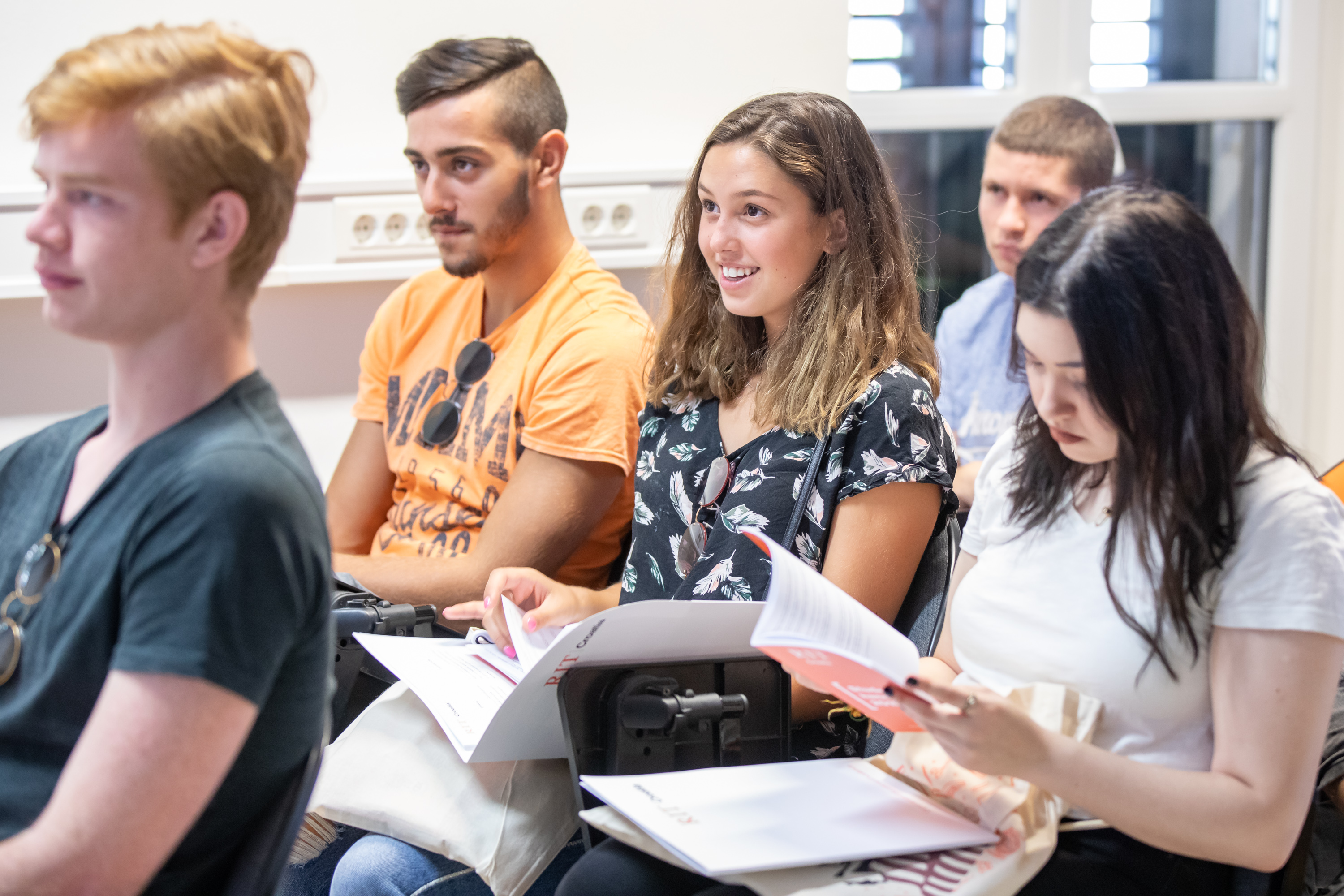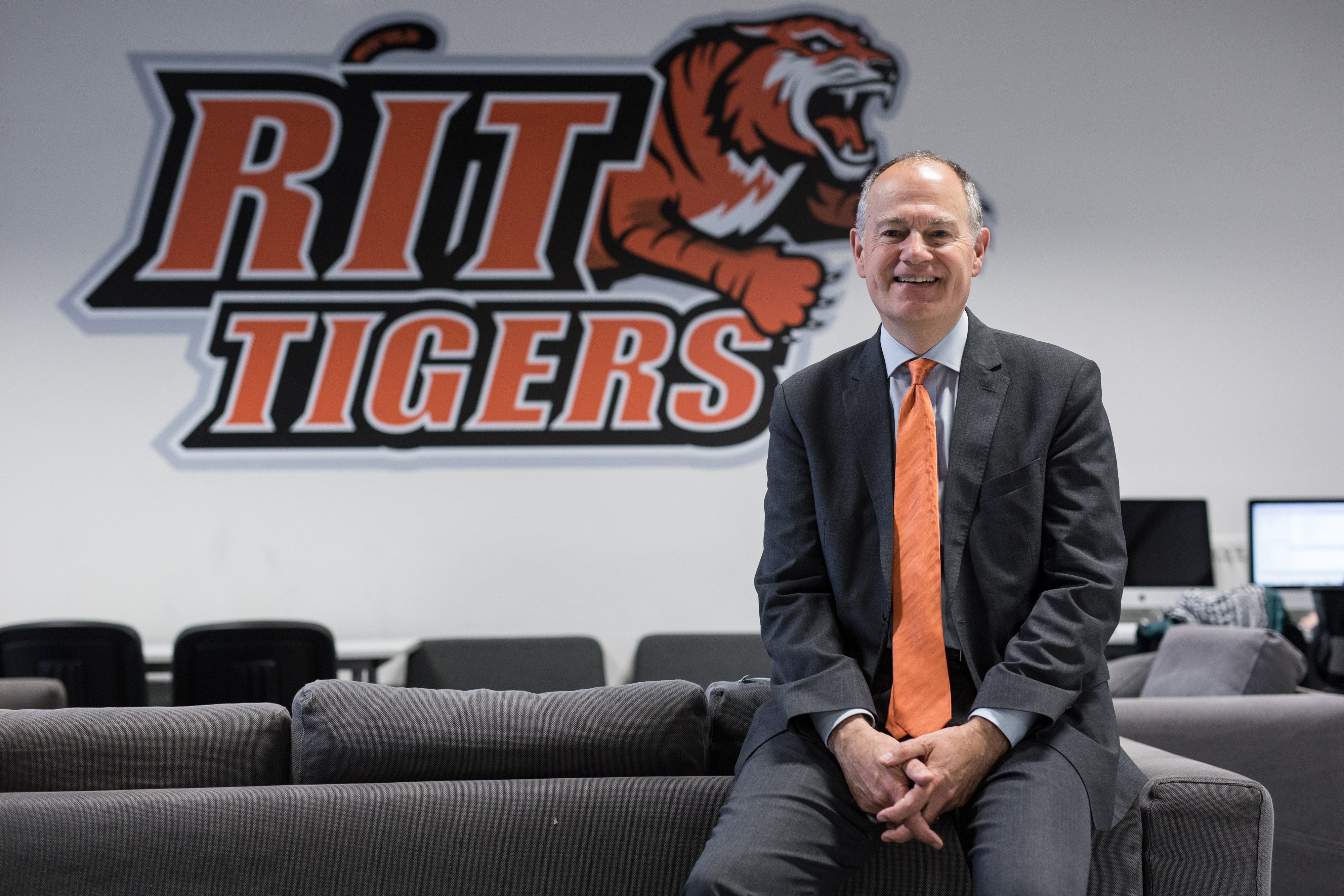We help our students become the best versions of themselves and easily compete in a global job market
RIT Croatia is a global campus of a prominent American private university Rochester Institute of Technology (RIT) and has been providing top American higher education programs in Croatia for over 20 years. Established in 1997, this college remains the only institution for higher education in Croatia that grants 2 diplomas – the American diploma awarded by RIT and a Croatian diploma awarded by RIT Croatia.

RIT Croatia is a welcoming and dynamic community to more than 850 students. They attend classes in English, which is the official language of this college, and study in a vibrant international environment. Furthermore, students receive the American education and diploma of the same quality like RIT’s students on other campuses in USA, China, Dubai and Kosovo. Furthermore, their students have an opportunity to cooperate with their peers from other campuses, and spend a semester or two in Rochester or Dubai.
On their campuses in Dubrovnik and Zagreb, they offer the following American undergraduate (BSc) programs:
-
International Business (Zagreb)
-
Hospitality and Tourism Management (Dubrovnik)
-
Web and Mobile Computing / Information Technology (Dubrovnik, Zagreb)
In addition, RIT delivers its Master of Science in Service Leadership and Innovation program on Zagreb campus. The college plans to launch yet another American MS program this Fall: Master of Science in Information Sciences and Technologies.
- We are living in quite challenging times for all segments of society, including higher education. How have you at RIT Croatia adapted to working remotely and how will you prepare for the next academic year?
Don Hudspeth, RIT Croatia, President and Dean: We are witnessing disruptive changes that are occurring as a result of the COVID-19 pandemic and this has impacted every industry, company and household in the world. In terms of education, this has accelerated digital transformation awaiting all businesses. And I do not think it will slow down. Being a part of a truly global university, all of the campuses started preparing for online transition very early. RIT has almost 40 years of experience in distance learning; the infrastructure and tools RIT Croatia uses to teach classes are laid out for both in-class and online teaching. In virtual classrooms, faculty combines synchronous activities (lectures through Zoom and Blue Jeans tools) and asynchronous activities through an online learning platform.
For us at RIT, the safety of our students, faculty and staff, and our all community has always been a priority number one. Since we transitioned online, we have been in daily contact with our students, to check how they have adjusted to the new situation and what their learning experience is. Nothing can replace the interaction with professors in the classroom, but they adapted well, just like we did. We finished our Spring semester in an online environment successfully, delivering classes to 165 sections from 73 different courses. Working in these challenging times rests on our collaboration with students, so the success outcome was a joint effort and we are grateful for it. We are now looking into possible future scenarios so we can properly prepare for the Fall. The future of education is now, and we are ready for it!

- What are the advantages of studying at RIT Croatia?
Don Hudspeth, RIT Croatia, President and Dean: There are many things that differentiate us in relation to other education institutions. One obvious is that we are a global campus of a 191-year old American university thus providing American higher education programs, but what stands out the most is our focus on career-development, developing practical knowledge and the cooperative education. RIT is internationally known for its career-oriented education. We offer our students motivating and challenging environment through various projects and interactive study. Our faculty encourages students to develop critical and analytical thinking, and to know how to deal with challenges and obstacles. Being a student-centric institution, we promote individual approach to all of our students. This is done from enrollment and admission to academic affairs to career advising throughout their studies. Students make decisions with regards to their academic lives and career paths – we are here to help them all the way. With high quality career-oriented education and committed faculty and administration, we help our students become the best versions of themselves and easily compete in a global job market.

-
How did your students react to online classes delivery at RIT Croatia?
Don Hudspeth, RIT Croatia, President and Dean: Overall the response from the students was very positive. They appreciated the efforts that the professors put in, in very short notice, to allow the classes to be completed remotely. The outcomes exceeded everyone’s expectations, both ours and the students. Many students found that they very much like the online platform for learning, while others found that they prefer the ‘live’ in-class model. I believe going forward it will be important to have both models available to the students.
-
Important part of education at RIT Croatia is the mandatory co-op experience (internships). How did you assist your students to make sure they complete all requirements and gain necessary work experience?
Don Hudspeth, RIT Croatia, President and Dean: This academic year, due to the situation caused by the COVID-19 pandemic, finding coop for our students will be much more challenging compared to previous years. Aware of the current situation in Croatia and in the world, we have adapted this year’s internship program by introducing additional models such as projects with companies, academic research and entrepreneurial projects. We have introduced flexibility in terms of the duration and period of internships so that students are not under pressure from the current situation in the world. Finally, we notice a more positive trend among employers when it comes to opening positions for professional internships – the situation is better today compared to March. We are always available to students and our Career Office will provide them with all the necessary support.
-
We are witnessing a huge impact this situation has on Croatian tourism. One of your programs at the Dubrovnik campus is focused on tourism and hospitality industry – why should future students consider this program?
Don Hudspeth, RIT Croatia, President and Dean: The tourism and hospitality industry will certainly be impacted this year by the COVID-19 pandemic, but the industry will not end, and will recover. Certainly the safety measures and the way in which the industry operates will change, and all of this is now included in our curriculum. Innovation, critical thinking, and creative thinking, are all important parts of our regular studies so that students are prepared for their future work environment. Also, all of these ‘soft skills’ are very transferrable so even if a student finishes our tourism and hospitality degree program, they are well prepared for entering other industries. This has been the case with our graduates in the past, and I don’t see this being any different going forward.
-
How did the situation caused by COVID-19 pandemics impact the end of academic year, more specifically, how did it impact the graduating generation of students? Have they successfully finished final exams?
Don Hudspeth, RIT Croatia, President and Dean: All students were able to finish their studies on time as originally planned. Final exams and graduation projects were all held virtually and it went very well. We have postponed our commencement ceremonies to Friday, November 6th, in Zagreb, and Saturday, November 7th, in Dubrovnik. For students who are not able to attend the November ceremonies they will be given the option to join for the May, 2021, ceremonies. It is very important to us that our students, who have put in great efforts to complete their degree programs, are given the opportunity to properly celebrate their accomplishments.